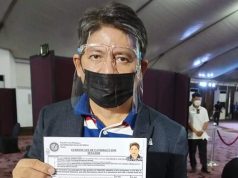
MANILA – Several groups have asked the Supreme Court to allow them to weigh in on the quo warranto petition filed by Solicitor General Jose Calida to against Chief Justice Maria Lourdes Sereno.
The Makabayan bloc of lawmakers led by ACT Teacher party list Rep. Antonio Tinio filed a motion of intervention on Thursday, with a warning that the quo warranto, if granted, would set a dangerous precedent threatening the independence of any impeachable officer, including members of the court and constitutional agencies, that may go against the interest of a sitting administration.
The Integrated Bar of the Philippines also served notice it was readying a motion for intervention in the quo warranto case.
Rep. Tinio pointed out that the high court itself had once said that shortcuts or any circumvention of the impeachment process, which the Constitution ordains as the only means for removing the chief justice, should not be allowed.
The SC had also rejected a petition to disbar one of its associate justices, on the same argument: that impeachment is the only process allowed by law. That same argument should apply to Sereno, Tinio added.
The Makabayan bloc said it is clear that those pushing the quo warranto route – the petition asks the SC to declare Sereno’s 2012 appointment as void for her alleged failure to meet basic qualifications – are solely driven by politics.
“Kapag kinatigan yung quo warranto, pinakamalinaw na panganib dito ay binabalewala ang Konstitusyon upang masunod kagustuhan ni Pangulong Duterte. Lalong mapagtitibay yung kanyang hangarin na mamuno bilang diktador dahil isasantabi ang Konstitusyon. Wala nang magiging hadlang sa one-man rule kung ganoon [If the quo warranto were granted, the clearest danger there is that the Constitution will be set aside to comply with the whims of President Duterte. His desire to rule as a dictator will be fueled. There will be no more barrier to one-man rule],” said Rep. Tinio.
Makabayan asked the SC to throw out the Calida petition, to which Sereno had submitted her formal comments last Monday (March 19), in compliance with orders of the en banc.
Other concerned citizens also filed motions to intervene, saying the case against Sereno should be allowed to reach impeachment court where she can defend herself in a trial by senator-judges.
“The reason cases like these are restricted to impeachment is precisely to avoid harassment suits. If the Supreme Court says that quo warranto petitions may be filed to oust them, nothing would stop any party from filing a quo warranto or any other proceeding against all the other impeachable officers,” said Atty. Barry Gutierrez, speaking partly in Filipino.
Meanwhile, the IBP said in a statement on Thursday that the Supreme Court cannot reverse a President’s decision to appoint a chief justice.
According to IBP, the tack of looking into Sereno’s alleged lack of integrity violates the separation of powers between the Executive and the Judiciary.
IBP President Ade Fajardo issued this statement on behalf of the biggest lawyers’ association on Thursday:
This is to announce that the Board of Governors of the Integrated Bar of the Philippines (IBP), in its meeting held yesterday, decided to formally file an intervention with the Supreme Court, in order to oppose and seek the dismissal of the petition for quo warranto initiated by the Office of the Solicitor General against Chief Justice Ma. Lourdes A. Sereno.
The IBP has the fundamental duty, shared with the Supreme Court, to uphold the Constitution, advocate for the rule of law and safeguard the administration of justice. The IBP Board of Governors thus decided to participate in the proceedings and offer legal insights, with careful effort not to fall into the trap of providing a simplistic answer to the rather complicated question that now confronts the judiciary, the resolution of which is of transcendental importance to our democracy.
The IBP opposition posits the following salient points, in brief:
1. Under the Constitution, impeachment is the only mode of removal of an impeachable officer for an impeachable offense.
2. The Supreme Court may not inquire into the Chief Justice’s alleged lack of integrity without violating the fundamental principle of separation of powers. Having been appointed to her current post, the Chief Justice is presumed to have been previously adjudged by the President as having met the requirement of integrity. Consistent with the separation of powers, such judgment cannot be reviewed, much less reversed, by the Supreme Court. The President remains the ultimate judge of a candidate’s worthiness.
3. Entertaining the quo warranto petition on account of the Chief Justice’s supposed lack of integrity is tantamount to subjecting her to the disciplinary authority of the Supreme Court. Under the Constitution, the members of the Supreme Court may not be ordered dismissed by any government authority other than by the Senate after an impeachment proceeding.
4. Since the Chief Justice may only be removed via impeachment on a question of integrity, the quo warranto proceedings against her may not prosper because what cannot be done directly cannot be done indirectly.









